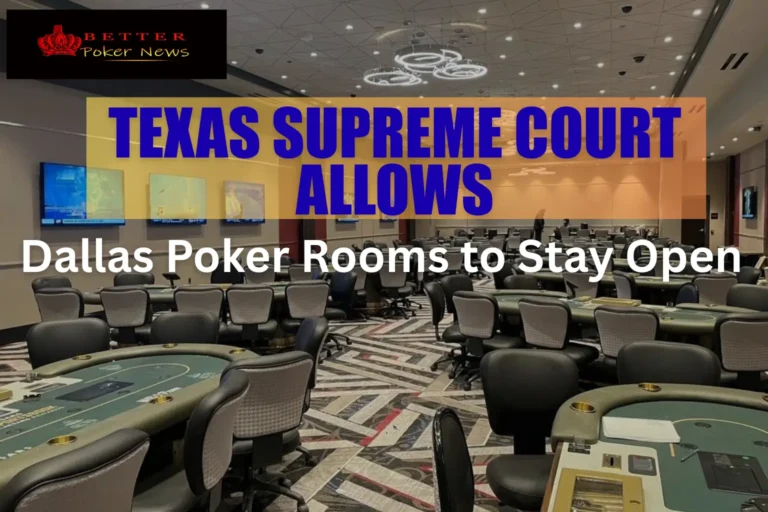In a landmark decision, the Texas Supreme Court recently turned down an appeal, enabling poker rooms in Dallas, such as Texas Card House, to continue their operations. The ruling follows a legal dispute that began in 2020, leaving the future of poker clubs in Texas in limbo. The court’s refusal to review the case is a significant victory for these card rooms, which have been caught in a legal gray area surrounding the state’s gambling laws.

Keep Reading: Alex Montgomery Wins UKPC Masters Main Event, Claiming £92,500
A Legal Gray Area for Poker Clubs in Texas
Texas poker rooms have long operated in a legally ambiguous space. While gambling is generally prohibited in the state, there is an exception for private games where all players face equal risk and the host does not take a share of the winnings. Clubs like Texas Card House claim they adhere to these stipulations by charging membership and seat fees instead of taking a cut from the players’ earnings.
The conflict arose when the city of Dallas issued permits to poker clubs in 2020 after months of discussions with operators. However, in 2022, the city reversed course, claiming it had made a mistake by approving those permits in the first place. This sparked a legal battle that culminated in the Texas Supreme Court’s recent decision.
Also Read: PokerStars WCOOP 2025 Preview: Massive Prize Pools, Championship Events, and More
City’s Internal Dispute Leads to High Legal Costs
The legal case, spearheaded by Andrew Espinoza, Dallas’ former chief building inspector, led to a complex and costly legal battle. Espinoza filed a lawsuit against both Texas Card House and the Dallas Board of Adjustment, arguing that the poker room’s occupancy permit should be canceled. This set the stage for a bizarre courtroom scenario where the city essentially sued itself, leading to escalating legal expenses.
Court records reveal that the city has spent over $500,000 in public funds on legal fees related to the dispute. This large sum has raised concerns among some Dallas council members, who criticized the expenditure, especially considering that businesses contributing to the city’s economy remained uncertain about their futures.
Fifth Court of Appeals Ruling Clears the Way for Poker Rooms
While the district court initially sided with Espinoza, the Fifth Court of Appeals in Dallas reversed that decision in 2024. The appellate judges concluded that the trial court should have respected the ruling made by the Board of Adjustment, which had granted Texas Card House the right to continue operating. With the Texas Supreme Court opting not to take up the case, the appeals court’s decision now stands, effectively ending the legal battle for Texas Card House, at least for the time being.
Despite this ruling, the broader question remains unanswered: Do social poker clubs in Texas truly operate within the bounds of state law? Other establishments like Champions Social Club in Far North Dallas are still locked in legal disputes, with city officials continuing to question whether these clubs can legally host poker games.
Read: Stephen Bean Banks £19,603 in 888poker LIVE London Victory
High Stakes for Poker Rooms: What Comes Next?
For now, the decision ensures that Texas Card House, Shuffle 214, and other poker clubs in Dallas can continue operating. However, this case does not provide a definitive resolution to the larger question about the legality of social poker clubs across the state. Legal experts continue to debate the issue, and other poker rooms in Texas are likely to face similar legal challenges in the future.
As the industry remains in a legal gray area, the ruling offers temporary relief for businesses like Texas Card House. Yet, the uncertainty surrounding the legality of poker clubs in Texas persists, and future challenges are almost inevitable.
The Legal Battle’s Impact on Dallas’ Economy
One of the more surprising aspects of this ongoing saga is the economic impact. Poker clubs, such as Texas Card House, have become profitable businesses, generating significant revenue for Dallas. Critics of the city’s legal challenge have pointed out that the city was spending large sums of taxpayer money to fight a legal battle that could have been avoided with clearer laws. With local businesses in limbo and public funds being drained for litigation, many have questioned the city’s priorities.
Looking Ahead: Will Other Texas Poker Rooms Follow Suit?
The ruling may not only have significant implications for Dallas but could set a precedent for poker rooms across Texas. While the immediate effect is favorable for Dallas poker clubs, the legal uncertainty remains. Other cities in Texas may soon face similar cases as more poker rooms emerge, potentially leading to a larger state-level debate about the future of social poker.
As the dust settles in Dallas, poker operators across Texas will be closely monitoring developments, hoping for a clear resolution that will allow them to operate without fear of legal repercussions.
FAQs
- Why is poker in Texas legal?
Poker rooms in Texas are legal if all players have an equal chance of winning and the host doesn’t take a cut of the winnings. They usually charge membership or seat fees instead. - What does the Texas Supreme Court decision mean for Dallas poker rooms?
The decision means that poker rooms in Dallas, like Texas Card House, can continue operating without immediate legal threat. - How much money has Dallas spent on legal fees?
Dallas has spent over $500,000 in legal fees related to the dispute over poker rooms. - Are all Texas poker rooms in a legal gray area?
Yes, the legality of poker rooms in Texas remains uncertain, as the state’s gambling laws are ambiguous about social poker clubs. - What happens next for Texas Card House and other poker clubs?
While Texas Card House can continue its operations, the legal status of poker clubs in Texas is still under debate, with other clubs potentially facing legal challenges.
Content Courtesy: GAMBLING NEWS


3 Comments
Pingback: PGT Venetian Las Vegas Classic
Pingback: WPT Global's Golden Ticket: $1 Million Main Event Awaits
Pingback: BetClic Poker Adds Progressive Knockout Tournaments